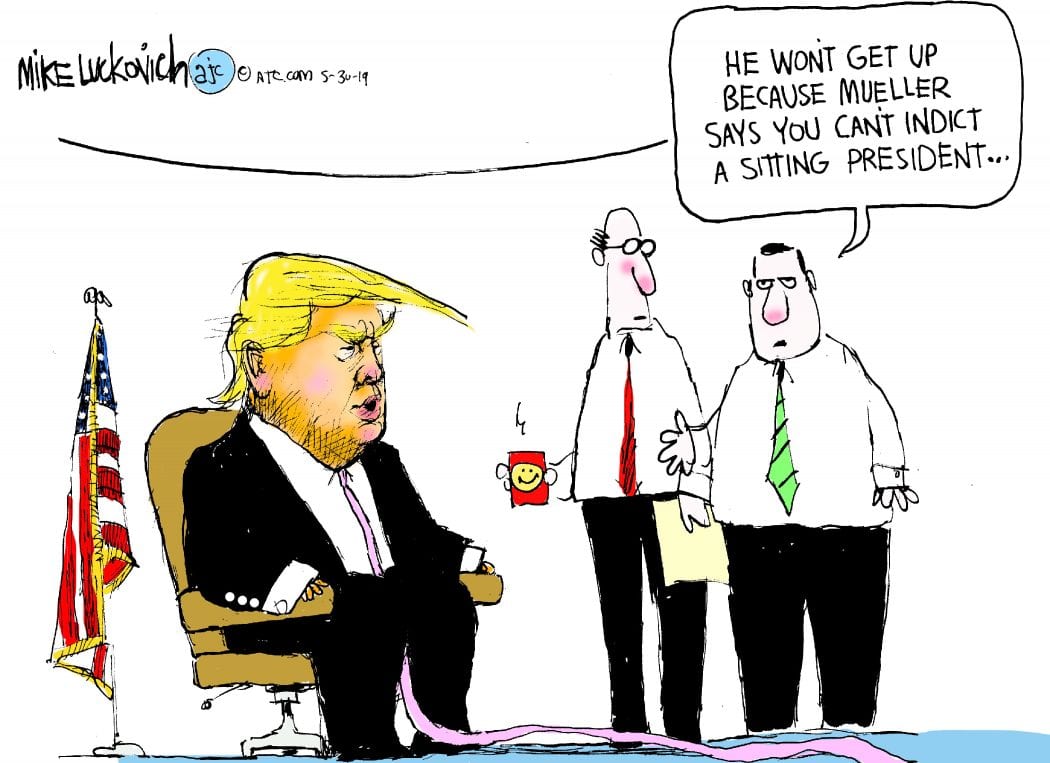BY JOE CONASON
 Behind the straight-shooting, ramrod demeanor always mentioned by his friends, Robert Mueller possesses a shrewd intelligence. He demonstrated that strategic acuity on Wednesday morning when, with a few carefully selected sentences, he wielded his own reticence to deliver a crushing blow to Donald Trump [and a hard shot to Attorney General William Barr, the White House henchman].
Behind the straight-shooting, ramrod demeanor always mentioned by his friends, Robert Mueller possesses a shrewd intelligence. He demonstrated that strategic acuity on Wednesday morning when, with a few carefully selected sentences, he wielded his own reticence to deliver a crushing blow to Donald Trump [and a hard shot to Attorney General William Barr, the White House henchman].
The more diffidence Mueller displayed in speaking publicly – after two years of principled silence as special counsel – the more powerful were the words he chose to utter. Standing before the seal of the Justice Department, he told us it is important that his 448-page report “speak for itself.” Yet, with the nation listening, he briskly underlined the most salient aspects of the report, which the great majority of his fellow Americans will never read.
Mueller wants us to understand – contrary to whatever Trump, Jared Kushner or assorted Republican patsies might claim – that the Russian plot to sway the 2016 election against Hillary Clinton was a historic assault on our democracy. This act by a hostile foreign power was a matter “of paramount importance” that “deserves the attention of every American.”
Rather than clear Trump and his associates of conspiring with the Russians, Mueller pointed not only to the “numerous efforts emanating from Russia to influence the election” but also his report’s “discussion of the Trump campaign’s response to this activity,” which was enthusiastic if not provably criminal – despite his ultimate finding that “there was insufficient evidence to charge a broader conspiracy.”
The former FBI director also hopes we will grasp the gravity of charges that Trump obstructed justice, and realize why he spent so much time and effort investigating those accusations. “When a subject of an investigation obstructs that investigation or lies to investigators,” he intoned, “it strikes at the core of their government’s effort to find the truth and hold wrongdoers accountable.” In other words, the cover-up is as despicable as the crime.
Then he delivered the harshest judgment. It wasn’t surprising to anyone who has read the report or the media coverage, but it was still news because he said it aloud. After months of gathering evidence about the president’s efforts to block his investigation, he said, “if we had had confidence that the president clearly did not commit a crime, we would have said so.” But he didn’t.
Neither could he say that the president indeed had committed a crime, as he explained, for two reasons: In fairness, no prosecutor should allege a crime that will not be the subject of indictment and trial, because that deprives the accused of a forum to determine guilt or innocence. And the president, according to Justice Department policy that the special counsel must obey, cannot be indicted and tried while in office.
That reasoning, of course, is exactly the opposite of what Barr claimed when he presented his version of the Mueller Report. Back then, the attorney general insisted Mueller’s decision about charging Trump had not relied upon that Justice Department policy. Even while he indicated that Barr had lied about that salient issue, Mueller said he “appreciated” the attorney general’s decision to release the report and doesn’t question “his good faith.”
That was well played – as was his implicit rebuke to Trump when he concluded by praising the fairness and professionalism of the prosecutors, FBI agents, analysts and staffers. Unlike the president, who has disparaged them so viciously over the past two years, Mueller described them as serving with “the highest integrity.”
The departing special counsel will now return to private life, after a long career devoted to the FBI and the Justice Department. While he emphasized his wish not to testify publicly in Congress, that is not a decision for him to make. In fact, many significant questions about his investigation still require answers. [Perhaps the House Judiciary Committee should also call a few of his deputies, who may be more willing to testify.]
According to his associates, Mueller’s demurral is meant to express his distaste for “politicizing” the Russia investigation. But on the most pressing political issue that we face today, he said on Wednesday what everyone in Washington already knows about his report.
The special counsel could not indict Trump. And he would not clear Trump, who has obviously violated the public trust and several federal statutes. So, as usual, he consulted the relevant rules and regulations, which led him directly to the Constitution – a document that “requires a process other than the criminal justice system to formally accuse a sitting president of wrongdoing.”
If that isn’t an impeachment referral, then what is?
– Joe Conason’s columns appear regularly in The Oklahoma Observer
Creators.com







